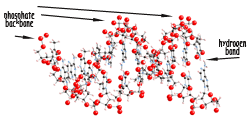Nucleic Acids
DNA and RNA
What is the difference between DNA, genes, chromosomes....
DNA is a natural polymer, the famous double helix, made of nucleotides, which carries the information to construct some kind of life: a human being, a banana, a bacteria, whatever. This information consists of how to construct proteins. Proteins, which are also natural polymers, may consist of only a few dozen aminoacids but large proteins have thousands of them. The largest protein, titin, has around 30 thousand aminoacids.
Cellular DNA can be very long, of the order of several hundred million nucleotides.
The more precise definition of a gene, in my view, is that a gene is a piece of DNA that codes for the synthesis of a protein.
Some books define the gene as the piece of DNA required to code for a trait. This definition is usually found in the context of Mendel's Laws and classical genetics.
Chromosomes are strands of DNA packed with proteins. The proteins make possible that the DNA is bent and packed very tightly. For instance, these proteins called histones reduce the electric repulsions between the negatively charged phosphate groups. This way, sequences of several hundred million bases can be fitted in the nucleus of a cell, which has a diameter of approximately 10 microns.
Chromosomes only form when the cell is about to divide. They are large enough to be seen on the optical microscope and they can be dyed. Chromosomes were first discovered because of this ability to absorb a dye. Chromos (Greek) means colour.
For instance the bacteria E.coli has only 1 chromosome, containing 5 genes, while humans have 46 chromosomes containing thousands of genes.
Notice that many organisms have more chromosomes than humans, and that doesn't imply it being more complex than humans. This is just a way of dividing the DNA. For instance pigeons have 80 chromosomes and a gorilla has 48.

